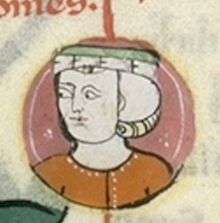William, Count of Sully
William the Simple (c. 1085 – c. 1150) was Count of Blois and Count of Chartres from 1102 to 1107, and jure uxoris Count of Sully. William was the eldest son of Stephen-Henry, Count of Blois and Adela of Normandy,[1] daughter of William the Conqueror. He was the older brother of Theobald II, Count of Champagne, King Stephen of England and Henry, Bishop of Winchester.

In the absence of male issue to Henry I, William was the eldest legitimate grandson of William the Conqueror. He would thus have been the principal rival to Henry's daughter Matilda to inherit the throne after Henry's death. However, he was not considered as a candidate for the English crown. Several historians have taken the view that he was passed over because of mental deficiency; hence his soubriquet "William the Simple". Though widely argued, this has never been clearly substantiated.
William was at first groomed to inherit the comital thrones of Blois and Chartres, and was designated count shortly before his father's departure on his second crusade in 1102.[2] However he was soon removed from wide-ranging comital duties by his mother, because of his erratic behaviour. He once assaulted and threatened to kill the Bishop of Chartres over a jurisdictional dispute. So, when her second son Theobald came of age, around 1107, Adela elevated him to the position of count of Blois-Chartres,[3] and forced William to retire to his wife's lands in Sully.
Family and Children
In 1104, William married Agnes of Sully, the heiress to the lordship of Sully-sur-Loire,[4] a woman attached to the court of William's mother. Their children included:
- Raoul de Blois de Sully, Abbé de Cluny (Abbaye) 1102-1176
- Margaret (c. 1105–1145). She married Henry, Count of Eu, Lord of Hastings, about 1122[5]
- John, Count of Eu and Lord of Hastings (1130-26 June 1170), married Alice d’Aubigny (Calvados), Lady of Smergate, had issue.
- Béatrice d’Eu
- Mahaut d'Eu
- Etienne d'Eu
- Henry de Sully, Abbot of Fécamp (died 1189)
- Rudolph de Blois de Sully (1104-1176)
- Elisabeth de Blois, Abbesse de Caen (1105-1128)
- Eudes-Archambaud III de Champagne de Sully, Sire of Sully
Notes
- Evergates 2007, p. 248.
- Crouch 2000, p. 12.
- LoPrete 2007, p. 216.
- LoPrete 1991, p. 31.
- LoPrete 2007, p. 388.
References
- Crouch, David (2000). The Reign of King Stephen; 1135–1154. Harlow:Pearson Education Lmt.CS1 maint: ref=harv (link)
- Evergates, Theodore (2007). The Aristocracy in the County of Champagne, 1100-1300. University of Pennsylvania Press.CS1 maint: ref=harv (link)
- LoPrete, Kimberly A. (2007). Adela of Blois: countess and lord (c.1067-1137). Four Courts Press.CS1 maint: ref=harv (link)
- LoPrete, Kimberly A. (1990). "Adela of Blois: Familial Alliances and Female Lordship". In Evergates, Theodore (ed.). Aristocratic Women in Medieval France. University of Pennsylvania Press.CS1 maint: ref=harv (link)
William, Count of Sully Born: c. 1085 Died: c. 1150 | ||
| Preceded by Stephen-Henry |
Count of Blois and Chartres 1102–1107 |
Succeeded by Theobald IV |
| Preceded by Giles |
Count of Sully | Succeeded by ? |